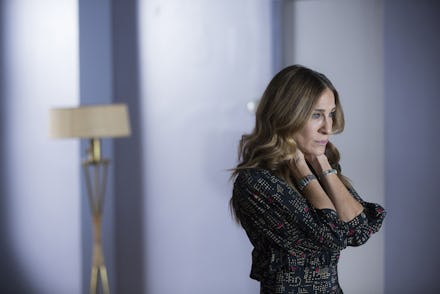'Divorce' review: Sarah Jessica Parker's HBO return is Carrie Bradshaw's dystopian future

It is almost impossible to look at Sarah Jessica Parker and not see Carrie Bradshaw. That's how definitive the actress' former role is. Carrie is one of TV's most iconic characters, and thus, Sex and the City stays fixed in the mind while watching Divorce, Parker's return to HBO and one of fall's darkest comedies.
Carrie Bradshaw is inescapable for Parker — but for Divorce, that's not a bad thing. In fact, it offers an alternate way to watch the show: Imagine that, instead of living the single life in Manhattan, Carrie got married, moved to the suburbs and had kids. Divorce is a dystopian imagining of what that would be like.
Frances is a head-hunter ("executive recruiter," she clarifies pointedly in the series' third episode) living in a miserable marriage. Her husband Robert (Thomas Haden Church) is a cartoon of a man, deliriously off-kilter but obstinate that he's always right.
One day, they go to a birthday party for their friend Diane (Molly Shannon), who's turning 50 and stuck in a similarly terrible union with her husband, Nick (Tracy Letts). The party escalates, Diane gets drunk, and she nearly shoots Robert while trying to shoot her husband. Nick has a heart attack, Diane is carted off by the police and Robert's complaining about nearly getting shot.
Meanwhile, all Frances can do is stare off into nothingness, lost deep in thought. Then, after a brief argument with Robert, she drops the title: "I want a divorce."
Of course, it's not that easy. Frances is having an affair with an Australian (Jemaine Clement) who is deeply unsettled by her choice to leave Robert. Panicked, she tries to reconcile with Robert — but he figures out what's been going on. Suddenly, the power is in his hands — and he's ready for a fight.
Six episodes were screened for critics, and suffice it to say, there's nothing easy about this divorce. The two try counseling, mediation, lawyering up and more; each new venture is a painful endeavor. Creator Sharon Horgan (best known for the Amazon series Catastrophe) has built a brutal series that doesn't much care for its audience's comfort — this is as tough for you as it is for them.
It's little wonder, then, that reviews so far have referred to the show as "suffocating," "bleak and bitter" and "hard to watch." Frankly, that's all true — but it also undersells how smart and funny the series is.
Church is giving the kind of absurd, hard-charging performance that helps puncture the show's dark atmosphere. He and Parker play well against each other, especially when she manages to turn the tables and pin him. In the series' third episode, Frances catches Robert in a lie that involves an emotional affair and delivering water to 9/11 first-responders. It's the funniest joke of the series so far.
Shannon is the show's comic saving grace, separate enough from the main action to be broadly funny without disturbing Divorce's tone. She's an alternate-world Charlotte from Sex and the City, one who let her neuroses get the better of her and rebelled against her previous good-streak.
But the main connection to Sex and the City (beyond Parker) is in the show's potential audience. Older millennial and early Gen X women who grew up watching the iconic HBO sitcom are around the age now where the misery of marriage is likely a much more familiar, relatable concept for many than the fantastical world of money found in the Sex and the City feature films.
That's the show's real darkness. It's not in the lighting (which is admittedly dim) or in the comedy (which is pitch-black at times) — it's in how it reflects the worst parts of real life. Sex and the City was, for all its momentary dramas, an ideal world for Carrie. For Frances, Divorce is hell.